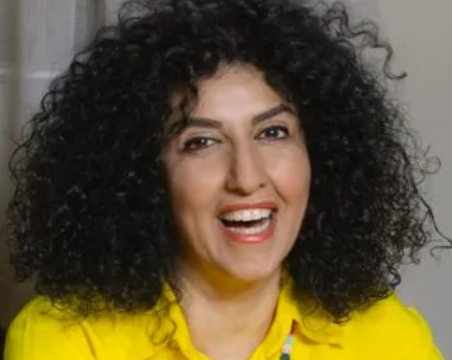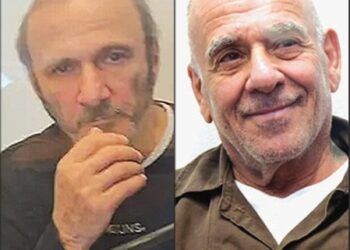December 1, 2023

The Nobel Peace Prize has been awarded to a second Iranian who is a woman like the first winner and who in fact ran the human rights group set up by that first Nobel laureate.
The award was announced in October going to Narges Mohammadi, 51, who has been an advocate for human rights and is in prison right now for that advocacy. In more than a century of awarding the Peace Prize, Mohammadi is the fifth person to win it while imprisoned.

In Tehran the Iranian Foreign Ministry said, “We note that the Nobel Peace [Prize] Committee awarded the peace prize to a person who was convicted of repeated violations of laws and criminal acts. We condemn this spiteful and political move.”
In Washington, President Biden said the award “is a recognition that, even as she is currently and unjustly held in Evin prison, the world still hears the clarion voice of Narges Mohammadi calling for freedom and equality.” He called Mohammadi “an inspiration to people everywhere.”
Twenty years ago in 2003, the award went to Shirin Ebadi, a lawyer and human rights activist. Ebadi used her award money to set up a group called the Defenders of Human Rights Center, and she brought in Mohammadi to run it on a day-to-day basis. The regime has long targeted everyone who worked with Ebadi in the group.

Three years ago, Ebadi wrote of Mohammadi: “Despite the chains in which she has been placed, Narges still roars like a lioness. This is why the regime wants to crush her.”
Ebadi’s award drew international attention and brought a new focus on human rights violations by the Islamic Republic. Mohammadi’s award had not drawn anywhere near as much attention as Ebadi’s drew, however, partly because Mohammadi is in prison and cannot speak out daily like Ebadi, but mainly because the Hamas attack on Israel a few days later quickly dominated the news and put an end to news stories about the Nobel Prize.
It took almost a month for Mohammadi to get a letter smuggled out of Evin Prison. Her daughter, Kiana, read it in a video posted on the Nobel website. Kiana added a personal note: “I miss you dearly…. Keep fighting for a better Iran.”
Mohammadi said she was sending greetings and gratitude to the Nobel committee on behalf of 47 women political prisoners being held with her.
“I am grateful to all of you and urge you to support the people of Iran until final victory. Victory is not easy, but it is certain,” she wrote.
It was reported the same day that Mohammadi had been denied hospital treatment because she is refusing to wear a head covering over the mass of hair she has grown since her imprisonment. Alieh Motalleb-zadeh, a civil rights activist, said, “Unfortunately, Narges Moham-madi’s health is not good. Her heart veins are blocked and she needs angioplasty. However, the authorities have refused to transfer her to a medical facility because Narges refuses to wear a headscarf.”
After a few weeks, Narges went on a hunger strike. The authorities at Evin immediately relented and sent her to a hospital without requiring that her hair be covered. She was at the hospital just one day, and then was returned to Evin with doctors quoted as saying there was nothing wrong with her health. She then ended her hunger strike after three days. A week later, she was again taken to a hospital. News reports said tests taken on her first hospital stay showed the blockage of two heart arteries, with complications such as fluid accumulation around the heart and esophageal inflammation.
She was returned to her prison cell—but days later was taken to the hospital a third time, again refusing to cover her hair. She was returned to prison after undergoing an angiography.
The only known response by the regime has been to charge her with yet more crimes. This marks the “seventh case opened against her in the last nine months,” according to an Instagram post
Mohammadi is currently serving a 12-year sentence on assorted political charges, including the classic “propaganda against the Islamic Republic.”
She was born in Zanjan to a family of Azeri origin. She began her activism while studying physics at a university in Qazvin. She was arrested twice for her activism while in college.
In 2003, Ebadi was abroad when she was announced as the Nobel Prize winner. She was preparing to return home but took the advice of numerous friends not to do so and has been living in exile ever since.
Mohammadi has been arrested 13 times, convicted five times and sentenced to a running total of 31 years plus 154 lashes.
She gets to talk to her family periodically by phone. Her husband, Taghi Rahmani, who was imprisoned for 14 years before he moved abroad, and their 16-year-old twin daughter and son, Kiani and Ali, live in Paris. Husband and wife have not seen each other for 15 years and the twins have not seen their mother for seven years.
Mohammadi was most recently arrested in response to her personal campaign against the use of the death penalty in the Islamic Republic.
In announcing the award, Berit Reiss-Andersen, the Nobel committee chair, asked that Mohammadi be freed to attend the award ceremony in December. The Islamic Republic has not even acknowledged the request. In her announcement, Reiss-Andersen said:
“Narges Mohammadi is a woman, a human rights advocate, and a freedom fighter. In awarding her this year’s Nobel Peace Prize, the Norwegian Nobel Committee wishes to honor her courageous fight for human rights, freedom and democracy in Iran. This year’s Peace Prize also recognizes the hundreds of thousands of people who, in the preceding year, have demonstrated against the theocratic regime’s policies of discrimination and oppression targeting women. Only by embracing equal rights for all can the world achieve the fraternity between nations that Alfred Nobel sought to promote. The award to Narges Moham-madi follows a long tradition in which the Norwegian Nobel Committee has awarded the Peace Prize to those working to advance social justice, human rights and democracy. These are important preconditions for lasting peace.
“In the 1990s, as a young physics student, Narges Mohammadi was already distinguishing herself as an advocate for equality and women’s rights. After concluding her studies, she worked as an engineer as well as a columnist in various reform-minded newspapers. In 2003 she became involved with the Defenders of Human Rights Center in Tehran, an organization founded by Nobel Peace Prize laureate Shirin Ebadi.”
Newspapers in Iran did not carry articles announcing the award, but rather articles attacking the award and Mohammadi. Javan, an extreme right-wing daily, headlined its story: “Criminals Award a Separatist, Pro-Sanctions Iranian.” (Moham-madi has opposed Western sanctions for impoverishing the people.) Jam-e Jam ran a more modest headline: “For Nobel; against the people.” And Fahikhtegan blared: “Nobel for Shamelessness.”
In establishing the Nobel awards in the 1890s the Swedish industrialist and inventor of dynamite, said in his will that the Peace Prize must go to a person or people who have “done the most or best to advance fellowship among nations, the abolition or reduction of standing armies, and for the holding and promotion of peace congresses.” In recent decades, the award committee has focused mainly on human rights campaigners.


























